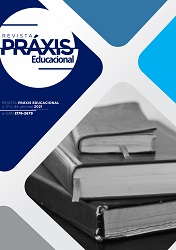NARRATIVE REFLEXIVITY AND SELF (TRANS)FORMING POWER
DOI:
https://doi.org/10.22481/praxisedu.v17i44.8018Keywords:
Training, Narrative reflexivity, SubjectivityAbstract
Biographical approaches in education, despite their diversity, have as a common assumption the transforming power of the action of narrating the lived experience. They admit that narrative reflexivity gives the person who narrates the possibility of giving meaning to what he did not have before and, by ordering the events, he (re)constructs another version of himself and of his formation. One of the great concerns of the research consists in examining the ways in which the action of language allows one to operate provisional versions of oneself and of the narrated experience. The objective of the article is to contribute to the studies on narrative reflexivity as a human capacity to operate these versions of self and its formative power with language. I will discuss the notions of autobiography and heterobiography in the articulation with narrative reflexivity and its incidences on human formation. I question the emergence of the self and the hesitant entry of subjectivity into qualitative research, adopting the perspective advocated by Dilthey (2010), who considers inseparable the links between "life, lived experience and science". The vitality of the subject is considered based on the notions of empirical subject, epistemic subject and autobiographical subject, as dimensions of subjectivity, whichare constituted by narrative reflection in the processes of production and reception of narratives of experience.
Downloads
Metrics
References
ASIHIVIF. Carta da ASIVIF. Nossa carta. Trad. Maria da Conceição Passeggi. Revista Brasileira de Pesquisa (Auto) Biográfica, Salvador, v. 01, n. 01, p. 177-179, jan./abr. 2016.
AUSTIN, J.L. Quando dizer é fazer: palavras e ação. Tradução Danilo Marcondes de Souza Filho. Porto Alegre: Artes Médicas, 1990.
BARTHES, Roland et al. Análise estrutural da narrativa. Trad. Maria Zélia barbosa Pinto. Petrópolis, RJ: Vozes, 2011.
BRUNER, Jerome. Fabricando histórias. Direito, Literatura, Vida. Tradução Fernando Cássio. São Paulo: Letra e Voz, 2014.
BRUNER, Jerome. Para uma teoria da educação. Trad. Manoela Vaz. Lisboa: Relógio D’Água Editores, 1999.
DELORY-MOMBERGER, Christine. Abordagens metodológicas da pesquisa biográfica. In: Revista Brasileira de Educação. Rio de Janeiro, v. 17, n. 51 set/dez, 2012b. p. 523-740.
DELORY-MOMBERGER, Christine. Biografia e educação: figuras do indivíduo-projeto. Tradução de Maria Passeggi, João Gomes da Silva Neto, Luís Passeggi. São Paulo: Paulus, Natal: EDUFRN, 2008.
DELORY-MOMBERGER, Christine. Vocabulaire des Histoires de Vie et de la Recherche Biographique. Toulouse: Érès.
DILTHEY, Wilhelm. Introdução às ciências humanas -Tentativa de uma fundamentação para o estudo da sociedade e da história. Trad. de Marco Antônio Casanova. São Paulo: Forense Universitária, 2010.
DOMINICÉ, Pierre. L’histoire de vie comme processus de formation. Paris: L’Harmattan, 2000.
FERRAROTTI, Franco. História, história de vida. O método biográfico nas Ciências Sociais. Tradução Carlos Galvão Braga e Maria da Conceição Passeggi. Natal: EDUFRN, 2012.
GADAMER, Hans Georg. Le problème de la conscience historique. Paris: Éditions du Seuil, 1996.
GADAMER, Hans Georg. Verdade e método I. Traços fundamentais de mais uma hermenêutica filosófica. Trad. Flávio Paulo Meurer. Brasil: Editora Universitária São Francisco, 1997.
JOSSO, Marie-Christine. Experiência de vida e formação. São Paulo: Paulus, Natal:Edufrn, 2010.
LABORIT, Emmanuelle, Le cri de la mouette, Paris: Robert Laffont, 1993.
PASSEGGI, Maria da Conceição. Enfoques narrativos en la investigación educativa brasileña. Revista Paradigma (Edición Cuadragésimo Aniversario: 1980-2020), Vol. XLI, p. 57-79, junio/2020. Disponível em: http://revistaparadigma.online/ojs/index.php/paradigma/article/view/929. Acesso em: 15 ago. 2020.
PASSEGGI, Maria da Conceição. Reflexividad narrativa: "vida, experiencia vivida y ciência”; Márgenes Revista de Educación de la Universidad de Málaga, 1(3), 91-109. https://doi.org/10.24310/mgnmar.v1i3.9504
Disponível em: https://revistas.uma.es/index.php/mgn/article/view/9504
PASSEGGI, Maria da Conceição Narrativas da experiência na pesquisa-formação: do sujeito epistêmico ao sujeito biográfico. Roteiro, Joaçaba, v. 41, n. 1, p. 67-86, jan./abr. 2016. Disponível em: https://portalperiodicos.unoesc.edu.br/roteiro/article/view/9267. Acesso em: 15 ago. 2020.
PASSEGGI, Maria da Conceição. Experiência em formação. Educação. Porto Alegre, v. 34, n. 2, p. 147-156, maio/ago. 2011b. Disponível em: https://revistaseletronicas.pucrs.br/ojs/index.php/faced/article/view/8697. Acesso em: 30 ago. 2020.
PINEAU, Gaston; Le Grand, Jean-Louis. As histórias de vida. Trad. Maria Passeggi; Carlos Braga. Natal: Edufrn, 2012.
PINEAU, Gaston. Emergência de um paradigma antropoformador de pesquisa-ação-formação transdisciplinar. Saúde e Sociedade, v.14, n.3, p.102-110, set./dez.2005. Disponível em: https://doi.org/10.1590/S0104-12902005000300006. Acesso em: 25 jul. 2020.
PRINCE, Gerald. Récit minimal et narrativité In: Le récit minimal: Du minime au minimalisme. Littérature, arts, médias [en ligne]. Paris : Presses Sorbonne Nouvelle, 2012 Disponível em : http://books.openedition.org/psn/190. Acesso em: 5 dez. 2020.
RICŒUR, Paul. Tempo e Narrativa, Tomos 1,2,3. São Paulos: Papirus, 1994.
SCHÖN, Donald. The reflective practitioner: how professionals think in action. New York: Basic Books, 1983.
TOURAINE, Alain. La société invisible. Regards (1974-1976). Paris: Éditions du Seuil, 1977.
Downloads
Published
How to Cite
Issue
Section
License

This work is licensed under a Creative Commons Attribution-ShareAlike 4.0 International License.
You are free to:
Share - copy and redistribute the material in any medium or format; Adapt - remix, transform, and build from the material for any purpose, even commercially. This license is acceptable for Free Cultural Works. The licensor cannot revoke these freedoms as long as you follow the terms of the license.
Under the following terms:
Attribution - You must appropriately give credit, provide a link to the license, and indicate if any changes have been made. You may do so in any reasonable way, but not in a way that suggests that you or your use is endorsed by the licensor.
There are no additional restrictions - You cannot apply legal terms or technological measures that legally restrict others to make any use permitted by the license.










